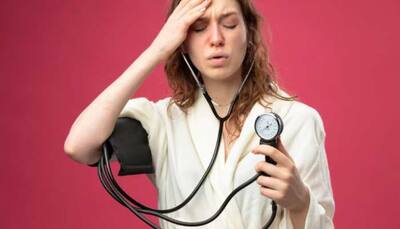The combination of caffeine, stress, and lack of sleep forms a dangerous trio that can lead to hypertension. Caffeine acts as a stimulant that increases your heart rate and constricts blood vessels, causing a spike in blood pressure. For some people, even small amounts of caffeine can trigger noticeable increases in their readings.
Dr. Rachit Saxena, Director and Senior Consultant, Cardiac Surgery, Narayana Hospital, Gurugram shares how caffeine, stress and sleepless days related to hypertension.
Stress is another major contributor to high blood pressure. When stressed, your body releases hormones that prepare you to fight or flee, increasing heart rate and blood pressure. If stress becomes chronic, it can cause long-term damage to your cardiovascular system.
Sleep deprivation worsens the problem by disrupting normal blood pressure regulation. During deep sleep, your blood pressure naturally falls, giving your heart and blood vessels a rest. Without enough quality sleep, your blood pressure remains elevated for longer periods, increasing the risk of hypertension.
To reduce hypertension risk, cut down on caffeine, develop healthy coping mechanisms to manage stress, and aim for 7-8 hours of restorative sleep each night. These lifestyle changes can greatly improve heart health and lower the chance of developing chronic high blood pressure.
Caffeine, stress, and lack of sleep are three common lifestyle factors that can significantly raise your risk of developing hypertension (high blood pressure). Caffeine is a stimulant found in coffee, tea, and many soft drinks, which can temporarily increase blood pressure by narrowing your blood vessels and stimulating your heart. While moderate caffeine intake is generally safe for most people, excessive consumption can contribute to sustained high blood pressure, especially in those sensitive to it.
Dr. Samir Kubba, Director & unit head – cardiology, Dharamshila Narayana Superspeciality Hospital, Delhi adds, “Stress triggers the release of hormones like adrenaline and cortisol, causing your heart rate and blood pressure to rise. Chronic stress keeps your body in a heightened state of alert, which can damage blood vessels over time and lead to hypertension.”
Sleep plays a crucial role in regulating your cardiovascular health. Poor or insufficient sleep disrupts your body’s ability to repair and regulate blood pressure. Studies show that people who consistently get less than 6 hours of sleep are at higher risk of developing hypertension.
Together, these factors create a perfect storm for high blood pressure. Managing caffeine intake, practicing stress reduction techniques like meditation or exercise, and prioritizing quality sleep can help protect your heart and maintain healthy blood pressure levels. Some amount of stress is good for growth and progress. However, watch yourself carefully, listen to your body, and become aware when your stress turns into distress.
Stay informed on all the , real-time updates, and follow all the important headlines in and on Zee News.








